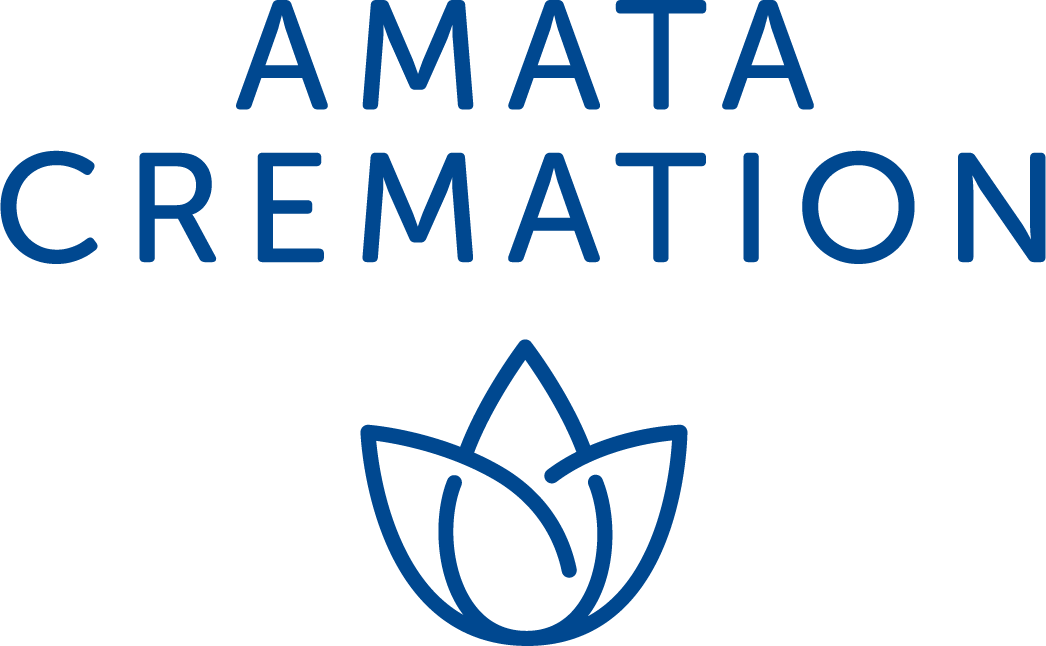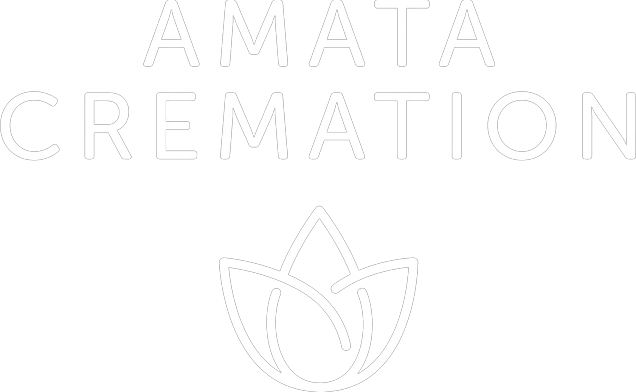Frequently Asked
Cremation Questions
Have Questions?
Amata Cremation knows how difficult it is to lose a loved one. With their passing, questions start to arise. We created our FAQ section with hope to help answer any questions you may have. If you have a question that you do not see listed, please feel free to contact us directly.
Questions About the Cremation Process
-
What is cremation?
Cremation is a type of final disposition, or the final treatment of a deceased individual’ remains. Cremation is a process through which the body of a deceased individual is reduced to cremated remains through a physical and chemical process involving both combustion and oxidation. The act of cremation occurs in a dedicated facility called a crematory and is overseen by a certified crematory operator.
-
What happens after the cremation is complete?
All organic bone fragments, as well as non-consumed metal items are collected from the cremation chamber into a stainless steel pan. All metals items (metal from clothing, hip joints, and bridge work, dental fillings, etc.) are separated from the cremated remains. This separation is accomplished through visual inspection as well as using a strong magnet. Any metals that can be recycled are recycled. Any funds derived from recycling are donated to American Foundation for Suicide Prevention, a non-profit suicide prevention organization. Remaining bone fragments are then processed in a machine to a consistent size and placed into a temporary or permanent urn, selected by the family.
-
Can the cremated remains be picked up?
Yes, Monday-Friday by appointment or they can be mailed through the United States Postal Service.
You can schedule the pickup or let us know the address for mailing by calling us at 513-728-3459, emailing info@amatacremation.com, or filling out the form the contact page.
-
In what kind of container are the cremated remains returned?
We return cremated remains in a temporary container but we offer a variety of affordable urns. The family may also choose to provide their own container in which the cremated remains will be placed. Learn more about what we offer.
-
Are all the cremated remains returned?
With the exception of minute and microscopic particles, which are impossible to remove from the cremation chamber and processing machine, all of the cremated remains are given back to the family.
-
Can I pre-plan my cremation with a local provider in Cincinnati?
Absolutely! Many families in Greater Cincinnati choose to pre-plan their cremation services to ease the emotional and financial burden on loved ones.
At Amata Cremation, we offer simple, inexpensive pre-planning options right here in the community, or start with our easy online pre-planning.
Concerns About Cremation
-
Can two cremations be performed at once?
By law and as a commitment to families, each cremation is performed individually. We carefully follow strict identification protocols to ensure your loved one’s dignity and integrity throughout the process.
-
Do I have to be present during the cremation?
While families are not required to be present, some find comfort in witnessing the start of the cremation. This can often be arranged in advance if it’s meaningful to your family.
We're here to support you during this difficult time.
-
Is cremation accepted by all religions?
Many religions have begun to allow their members to partake in cremation as a way of letting their followers personalize their final requests.
If you’re uncertain, we recommend consulting with your faith leader or asking our staff for guidance.
-
Does cremation affect my ability to have a funeral or memorial service?
Not at all. Families may choose to hold a traditional funeral, a memorial service after cremation, or even a celebration of life.
Cremation allows for great flexibility in planning meaningful tributes.
-
Will cremation limit my options for burial?
Cremation actually provides more options for your final placement than traditional burial.
Cremated remains can still be buried in a cemetery plot, placed in a columbarium, or interred in a family grave — offering flexibility while often lowering costs.
Questions About Urns, Caskets, & Embalming
-
Is a casket needed for cremation?
No, a casket is not required for cremation. A simple, rigid container approved for cremation can be used.
-
Is embalming required prior to cremation?
No, embalming is not required prior to cremation. In most cases, cremation takes place without embalming.
In special circumstances, embalming is commonly used if the decedent presents any contagious disease or infection. This is to protect anyone who may come in contact with the deceased.
-
Can the body be viewed without embalming?
Yes, you may select for immediate family members to briefly view the deceased prior to cremation at our cremation facility at an additional cost. The deceased is first washed, dressed and prepared for a private viewing. However, under certain circumstances additional alternative care may be required for autopsy remains, organ/tissue or bone donors.
-
What types of urns are available?
Urns come in a wide variety of styles, from simple and affordable designs to decorative pieces made of wood, ceramic, glass, or metal. Biodegradable urns are also available for scattering or green burials.
Contact us to learn more about our urns.
-
Can multiple family members share the cremated remains?
Yes. Many families choose to divide the remains into keepsake urns or jewelry, so each loved one can keep a portion close by.
-
What if I don’t choose an urn right away?
If you haven’t selected an urn, we will return your loved one’s cremated remains in a simple, secure container. You may purchase or transfer them to a permanent urn at any time in the future.
-
Are there cemeteries or memorial parks in Cincinnati and Northern Kentucky that accept cremated remains?
Yes, we work closely with Arlington Memorial Gardens.
However, many cemeteries throughout Cincinnati and Northern Kentucky offer options for interring cremated remains, including burial plots and columbarium niches. Our team can help guide you to locations that best fit your family’s wishes.




